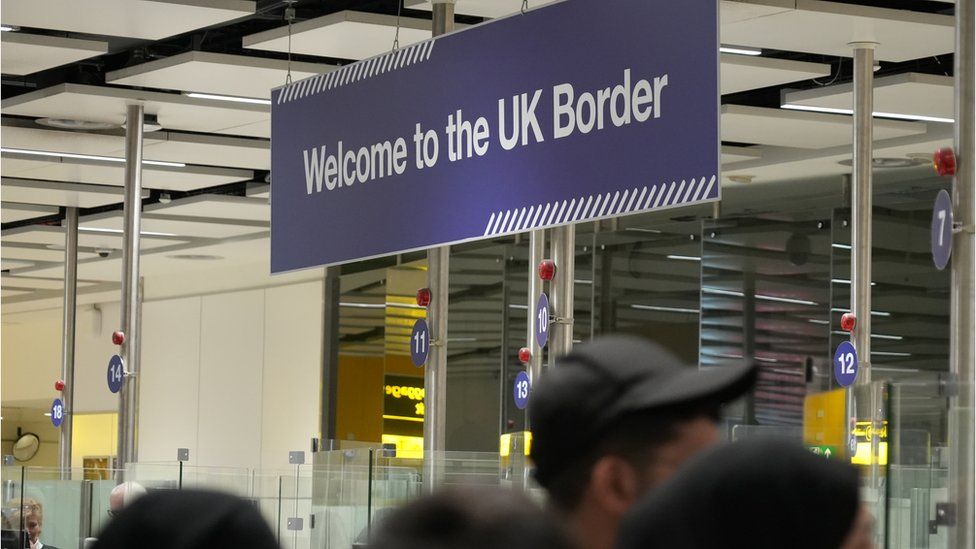Without conducting in-person interviews, the status of about 12,000 asylum seekers in the UK will be determined.
People from Afghanistan, Eritrea, Libya, Syria, and Yemen who applied before last July will have their cases decided based on a 10-page Home Office questionnaire.
The initiative aims to cut down on the backlog of asylum applications, which Prime Minister Rishi Sunak promised to eliminate this year. .
The Home Office claims that this is not an amnesty for those seeking asylum, but it will simplify things for five nationalities.
According to the Home Office, 95% of asylum requests from citizens of these nations have already been granted.
There won't be any face-to-face interviews this time around, according to officials, but the customary security and criminal checks and biometrics will still be taken.
Asylum seekers who qualify must instead complete a form and respond to up to 40 questions.
The questionnaire must be filled out in English and returned to the Home Office within 20 working days, failing which the Home Office may assume the asylum application has been withdrawn.
However, according to officials, if no response is given, a follow-up notification will be sent and each application will be evaluated on its own merits.
Having previously emphasized the value of in-person interviews, the Home Office is likely to encounter criticism that the fast-tracking is more motivated by the prime minister's pledge to reduce the backlog in asylum claims than by having stringent screening procedures for identifying people who are not legally allowed to be in the UK. .
A young man was killed outside a Bournemouth takeaway by an Afghan asylum seeker who was sentenced to life in prison last month.
Before moving to the UK, Lawangeen Abdulrahimzai was discovered to have fled Serbia after being found guilty of murder.
All participants in the new process, according to the Home Office, will undergo security vetting and a check against criminal databases.
Mr. Sunak promised in December that he would cut in half the number of people who had been waiting more than six months for a preliminary decision on their asylum application. In that group, more than 92,000 individuals have been located.
However, Downing Street's resolve to clear the backlog in asylum claims seems to entail making it easier for thousands of migrants—some of whom will have come to the UK in small boats—to obtain visas to remain in the country.
Home Secretary Suella Braverman may find the policy upsetting because she likes to think of herself as being strict when it comes to people who request asylum after traveling in an irregular manner. .
In small boats, a record 45,756 travelers made it to the UK last year.
In an interview with GB News on Wednesday, Ms. Braverman stated: "It is obvious that we have an unsustainable situation in towns and cities all over our country where we are now housing them in hotels due to the overwhelming number of people coming here illegally and our legal duties to accommodate them. ".
The Home Office plans to hire twice as many asylum caseworkers this year to help with the record number of people who are awaiting a decision on their application for asylum in the UK. There will likely be another increase in the backlog of cases, according to data that will be released later on Thursday.
The government has previously been urged to establish an expedited procedure for those seeking asylum from nations with high acceptance rates by the Refugee Council and the British Red Cross. They suggested 40,000 cases from Iran, Afghanistan, Eritrea, Syria, and Sudan be included in this category last year.
Due to their slightly lower grant rates—which are still around 80%—Sudanese and Iranian asylum seekers are not included in the list of those eligible for the Home Office's streamlined procedure.
According to Yvette Cooper, shadow home secretary, "It's damning that the Home Office isn't doing this already, given that Labour has been calling for the fast-tracking of cases for months, including for safe nations like Albania, and that the UNHCR recommended it two years ago.
"In the meantime, since Rishi Sunak promised to reduce the backlog, it has skyrocketed, increasing by 50%. ".
She continued by saying a Labour administration would put return agreements in place to ensure the safe return of rejected asylum seekers and would take stronger action against the gangs in charge of risky small boat crossings.







